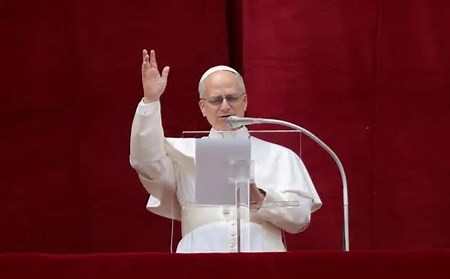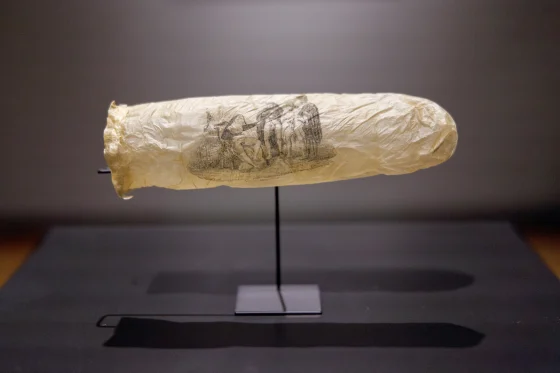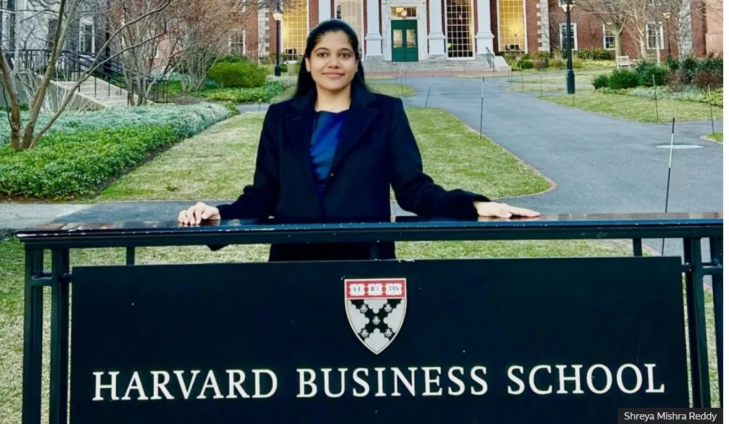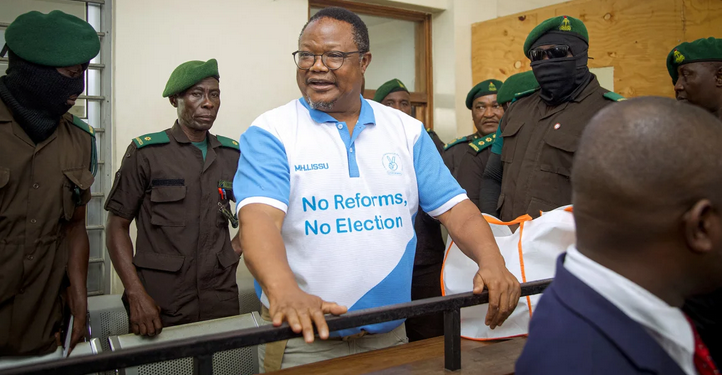International
Pope Leo XIV Calls for End to War in First Sunday Address

Pope Leo XIV has made a passionate appeal for peace during his first Sunday address at the Vatican on May 11, urging world leaders to put an end to global conflicts. The newly elected pontiff called for a “lasting peace” in Ukraine, a ceasefire in Gaza, and welcomed the agreement reached on Saturday to end recent hostilities between India and Pakistan.
Speaking from the central balcony of St. Peter’s Basilica, Pope Leo expressed his deep sorrow over the ongoing conflicts, emphasizing the need for global unity to prevent further devastation.

“The immense tragedy of the Second World War ended 80 years ago… now we’re facing the tragedy of a third world war in pieces,” he declared, adding a plea to global leaders: “no more war.”
The Pope reflected on the humanitarian crises unfolding across conflict zones:
- In Ukraine, he urged for an “authentic, true, and lasting peace,” expressing hope for the release of prisoners and the safe return of children to their families.
- On Gaza, he voiced his distress over the violence, calling for an immediate ceasefire and the allowance of humanitarian aid to civilians.
- He also commended the ceasefire between India and Pakistan, expressing hope that the agreement would lead to a “lasting accord.”
A Call for Peace Amid Global Tensions
Pope Leo’s address comes at a time of heightened global conflict. Ukrainian President Volodymyr Zelensky and Russian President Vladimir Putin have announced competing peace plans to end the three-year invasion of Ukraine. Meanwhile, Israel has resumed its military offensive in Gaza following the collapse of a two-month ceasefire and hostage exchange agreement.
In South Asia, India and Pakistan agreed to a tentative ceasefire on Saturday after days of cross-border strikes, sparked by an attack on tourists in Indian-administered Kashmir on April 22.
Inauguration and Early Days as Pontiff
Pope Leo XIV, born Robert Francis Prevost in Chicago, was elected as the 267th leader of the Catholic Church following the death of Pope Francis. He is the first American pontiff and only the second from the Americas, after Pope Francis of Argentina.
During his first days as Pope, Leo visited a shrine outside Rome, prayed at the tomb of Pope Francis, and held his inaugural Mass at the Sistine Chapel. He described his selection as “an unworthy choice” but pledged to continue the “precious legacy” of his predecessor, focusing on missionary work, dialogue, and care for the marginalized.
Pope Leo also explained his choice of the name Leo, inspired by a 19th-century pope known for his advocacy of social justice. In his speech, he emphasized the Church’s role in defending human dignity and justice amid technological advances, including artificial intelligence.

“I want to walk together with you as a united Church, searching all together for peace and justice,” Pope Leo told the gathered crowd in St. Peter’s Square.
Upcoming Inauguration
Pope Leo XIV is set to be formally inaugurated at a Mass in St. Peter’s Square on May 18, where he will deliver a homily before heads of state and dignitaries. Ahead of the event, he will meet with members of the media on Monday.
The new pontiff is widely seen as a moderate voice capable of providing “continuity” and “unity” in the Catholic Church, with a strong emphasis on compassion for migrants, the poor, and environmental stewardship—values closely aligned with those of his predecessor, Pope Francis.
International
200-year-old condom displayed in Amsterdam museum

An almost 200-year-old condom – in “mint condition” – has just gone on display at an exhibition at the Rijksmuseum in Amsterdam.
It is thought to be made of a sheep’s appendix and features an explicit print representing a nun and three clergymen.
The rare artefact dates back to 1830 and was purchased by the museum at an auction last year. The condom is part of an exhibition on 19th Century prostitution and sexuality. Prints, drawings and photographs also form part of the display.
Rijksmuseum curator Joyce Zelen told the BBC when she and her colleague first spotted the condom at auction they “were laughing”.
Ms Zelen said “no-one else noticed it” and they were the only ones who bid on it.
After obtaining the item, they inspected it with UV light and ascertained that it had not been used.
“It’s in mint condition,” said Ms Zelen.
Since it was put on display the museum has been packed with people – young and old – and the “response has been amazing”, she added.
Ms Zelen explained the condom is believed to have been a “luxury souvenir” from a fancy brothel in France, and that only two such objects are known to have survived to the present day.
The museum said the unusual item “embodies both the lighter and darker sides of sexual health, in an era when the quest for sensual pleasure was fraught with fears of unwanted pregnancy and sexually transmitted diseases – especially syphilis”.
The explicit print on this specific object shows the nun sitting in front of the three men with her dress up and her legs apart pointing her finger at the clergymen, all of whom are standing in front of her holding up their habits.
The condom also bears the inscription “Voilà mon choix”, meaning “There is my choice”.
The museum noted the print is thus to be considered as a “parody of both celibacy and the Judgement of Paris from Greek mythology”, the latter being the mythological story of a Trojan Prince named Paris who had to decide who was the fairest goddess among Aphrodite, Hera and Athena.
The Dutch museum notes that their Print Room collection holds some 750,000 prints, drawings and photographs but that this is the first example in the collection of a print on a condom.
“As far as we can tell we are the only art museum with a printed condom,” said Ms Zelen.
She said her institution was “open to loan” the artefact out to other museums, but noted that the condom was very delicate.
It will be on display until the end of November.
International
‘We did not sign up for this’: Harvard’s foreign students are stuck and scared

When Shreya Mishra Reddy was admitted to Harvard University in 2023, her parents were “ecstatic”.
It is “the ultimate school that anybody in India wants to get into,” she tells the BBC.
Now, with graduation around the corner, she has had to break the bad news to her family: she may not graduate in July from the executive leadership programme after the Trump administration moved to stop Harvard from enrolling international students “as a result of their failure to adhere to the law”.
“It has been very difficult for my family to hear. They’re still trying to process it,” she said.
Ms Reddy is one of around 6,800 international students at Harvard, who make up more than 27% of its enrolments this year. They are a crucial source of revenue for the Ivy League school. About a third of its foreign students are from China, and more than 700 are Indian, such as Ms Reddy.
All of them are now unsure of what to expect next. Harvard has called the move “unlawful”, which could lead to a legal challenge.
But that leaves the students’ futures in limbo, be it those who are waiting to enrol this summer, or are halfway through college, or even those awaiting graduation whose work opportunities are tied to their student visas.
Those who are already at Harvard would have to transfer to other American universities to remain in the US and retain their visas.
“I hope Harvard will stand for us and some solution can be worked out,” Ms Reddy says.
The university has said it is “fully committed to maintaining [its] ability to host our international students and scholars, who hail from more than 140 countries and enrich the University – and this nation – immeasurably”.
The move against Harvard has huge implications for the million or so international students in the US. And it follows a growing crackdown by the Trump administration on institutes of higher learning, especially those that witnessed major pro-Palestinian protests on campus.
Dozens of them are facing investigations, as the government attempts to overhaul their accreditation process and reshape the way they are run.
The White House first threatened to bar foreign students from Harvard in April, after the university refused to make changes to its hiring, admissions and teaching practices. And it also froze nearly $3bn in federal grants, which Harvard is challenging in court.
Still, Thursday’s announcement – which Homeland Security Secretary Kristi Noem said came because they were allegedly “fostering violence” and “antisemitism” – left students reeling.
Chinese student Kat Xie, who is in her second year in a STEM programme, says she is “in shock”.
“I had almost forgotten about [the earlier threat of a ban] and then Thursday’s announcement suddenly came.”
But she adds a part of her had expected “the worst”, so she had spent the last few weeks seeking professional advice on how to continue staying in the US.
But the options are “all very troublesome and expensive”, she says.

Harvard has been given 72 hours to comply with a list of demands to have an “opportunity” to regain its ability to enrol these students, including providing the government with all disciplinary records for non-immigrant students enrolled at Harvard over the past five years.
Noem also demanded Harvard turn over electronic records, videos, or audio of “illegal” and “dangerous or violent” activity by non-immigrant students on campus.
But the Trump administration also appeared to single China out when Noem also accused Harvard of “coordinating with the Chinese Communist Party” in her statement.
Beijing responded on Friday by criticising the “politicisation” of education.
It said the move would “only harm the image and international standing of the United States”, urging for the ban to be withdrawn “as soon as possible”.
“None of this is what we’ve signed up for,” says 20-year-old Abdullah Shahid Sial from Pakistan, a very vocal student activist.
A junior majoring in applied mathematics and economics, he was one of only two Pakistani undergraduate students admitted to Harvard in 2023.
He was also the first person in his family to study abroad. It was a “massive” moment for them, he says.
The situation he now finds himself in, he adds, is “ridiculous and dehumanising”.
Both Ms Reddy and Mr Sial said foreign students apply to go to college in the US because they see it as a welcoming place where opportunities abound.
“You have so much to learn from different cultures, from people of different backgrounds. And everybody really valued that,” Ms Reddy says, adding that this had been her experience at Harvard so far.
But Mr Sial says that has changed more recently and foreign students no longer feel welcome – the Trump administration has revoked hundreds of student visas and even detained students on campuses across the country. Many of them were linked to pro-Palestinian protests.
Now, Mr Sial adds, there is a lot of fear and uncertainty in the international student community.
That has only been exacerbated by the latest development. A postgraduate student from South Korea says she is having second thoughts about going home for the summer because she fears she won’t be able to re-enter the US.
She did not want to reveal her name because she is worried that might affect her chances of staying in the US. She is one year away from graduating.
She said she had a gruelling semester and had been looking forward to “reuniting with friends and family” – until now.
The anxiety among foreign students is palpable, says Jiang Fangzhou, who is reading public administration in Harvard Kennedy School.
“We might have to leave immediately but people have their lives here – apartments, leases, classes and community. These are not things you can walk away from overnight.”
And the ban doesn’t just affect current students, the 30-year-old New Zealander says.
“Think about the incoming ones, people who already turned down offers from other schools and planned their lives around Harvard. They’re totally stuck now.”
myjoyonline.com
International
Tanzanian opposition leader appears in court for treason trial

Tanzania’s main opposition leader Tundu Lissu told his supporters to have no fear as he appeared in court on Monday for the first time since his arrest on charges that include treason.
Lissu refused to participate in a hearing on April 24 because authorities conducted a virtual, rather than an in-person trial, with him appearing via video link from prison.
On Monday he entered the court with his fist raised in the air as supporters chanted “No Reforms, No Election,” according to a video of the courtroom shared by his CHADEMA party on X.
“We will be fine. You should not fear,” Lissu said as he took his place in the dock, waving victory signs.
Lissu, who was shot 16 times in a 2017 attack and came second in the last presidential poll, was charged with treason last month over what prosecutors said was a speech calling upon the public to rebel and disrupt elections due in October.
A series of high-profile arrests has highlighted the rights record of President Samia Suluhu Hassan, who plans to seek re-election. Hassan says the government is committed to respecting human rights.
Lissu’s CHADEMA party has demanded changes to an electoral process they say favors the ruling party before they participate in the ballot.
Several Kenyan rights activists, including a former justice minister, said they were denied entry to Tanzania as they traveled to attend the trial.
Kenya’s former Justice Minister Martha Karua, a prominent lawyer and opposition politician, and former Chief Justice Willy Mutunga were among those detained when they landed at Tanzania’s Julius Nyerere International Airport in Dar es Salaam, they said on X.
Tanzania’s immigration spokesperson Paul Mselle did not immediately respond to requests for comment.
“Today was going to be a big day and we went out there in solidarity,” Karua told Kenyan broadcaster NTV on Monday after she was denied entry and sent back to Nairobi.
“The state cannot be used as a personal tool. You cannot deport people whom you don’t like, who are not aligned to your views.”
Mutunga and rights activist Hussein Khalid were being held in an interrogation room at Julius Nyerere airport on Monday and expected to be deported, Khalid said on X.
Source: CNN.com
-

 Showbiz4 weeks ago
Showbiz4 weeks agoBogo Blay – Woman (Produced By FimFim)
-

 Opinion1 month ago
Opinion1 month agoA LETTER TO GES
-

 People & Lifestyle1 month ago
People & Lifestyle1 month agoThe differences between ‘I love you’ and ‘I’m in love with you’
-

 Showbiz4 weeks ago
Showbiz4 weeks agoWebz – Odo | MP3 Download
-

 Showbiz4 weeks ago
Showbiz4 weeks agoKofi Kinaata Honoured with “Youth in Entertainment” Award at 2025 Millennium Excellence Awards
-

 Sports4 weeks ago
Sports4 weeks agoEl Clásico Thriller: Barcelona Edges Real Madrid 4–3 in Seven-Goal Spectacle
-

 News4 weeks ago
News4 weeks ago‘Not Chosen by Merit’ – Ghanaian Prophet Predicts Short Papacy for Pope Leo XIV
-

 International4 weeks ago
International4 weeks agoVIDEO: Vladimir Putin Welcomes Burkina Faso’s Ibrahim Traoré to Russia for Victory Day Celebrations











































